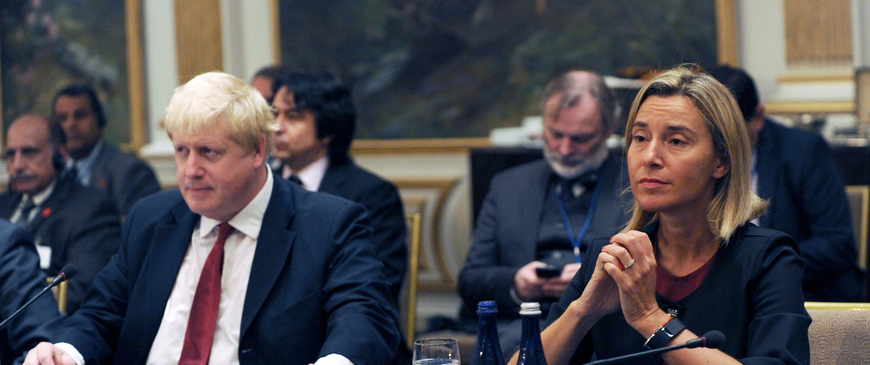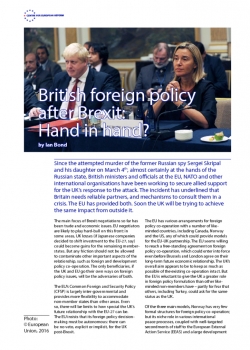
British foreign policy after Brexit: Hand in hand?
British foreign policy priorities will change little after Brexit, but London will need to find new ways to rally EU support for them.
Since the attempted murder of the former Russian spy Sergei Skripal and his daughter on March 4th, almost certainly at the hands of the Russian state, British ministers and officials at the EU, NATO and other international organisations have been working to secure allied support for the UK’s response to the attack. The incident has underlined that Britain needs reliable partners, and mechanisms to consult them in a crisis. The EU has provided both. Soon the UK will be trying to achieve the same impact from outside it.
Britain needs reliable partners, and mechanisms to consult them in a crisis. The #EU has provided both.
The main focus of Brexit negotiations so far has been trade and economic issues. EU negotiators are likely to play hard-ball on this front: in some areas, UK losses (if Japanese companies decided to shift investment to the EU-27, say) could become gains for the remaining member-states. But any friction should not be allowed to contaminate other important aspects of the relationship, such as foreign and development policy co-operation. The only beneficiaries, if the UK and EU go their own ways on foreign policy issues, will be the adversaries of both.
The EU’s Common Foreign and Security Policy (CFSP) is largely inter-governmental and provides more flexibility to accommodate non-member states than other areas. Even so, there will be limits to how special the UK’s future relationship with the EU-27 can be. The EU insists that its foreign policy decision-making must be autonomous: there can be no veto, explicit or implicit, for the UK post-Brexit.
The EU has various arrangements for foreign policy co-operation with a number of like-minded countries, including Canada, Norway and the US, any of which could provide models for the EU-UK partnership. The EU seems willing to reach a free-standing agreement on foreign policy co-operation, which could enter into force even before Brussels and London agree on their long-term future economic relationship. The UK’s overall aim appears to be to keep as much as possible of the existing co-operation intact. But the EU is reluctant to give the UK a greater role in foreign policy formulation than other like-minded non-members have – partly for fear that others, including Turkey, could ask for the same status as the UK.
The #EU is reluctant to give the UK a greater role in foreign policy formulation than other like-minded countries have.
Of the three main models, Norway has very few formal structures for foreign policy co-operation; but its niche role in various international peace processes, coupled with well-targeted secondments of staff to the European External Action Service (EEAS) and a large development budget, have enabled it to influence EU policy in the areas that matter to Oslo. Canada has negotiated a binding treaty, the Strategic Partnership Agreement (SPA), covering foreign policy among other things. This puts an obligation on the EU and Canada to hold regular consultations at various levels from expert to summit, with a focus on a number of agreed subjects and regions. The US has arrangements which are similar in substance to those for Canada, but only politically binding in form. But Washington, like Oslo and Ottawa, backs up all the formal structures with extensive informal contacts with the EU and the member-states.
Much of EU foreign policy is declaratory: statements supporting or condemning various developments around the world pour out not only from Brussels but from EU delegations in international organisations such as the Organisation for Security and Co-operation in Europe. At present, countries applying for EU membership such as Albania, would-be applicants such as Ukraine, and European Economic Area members such as Norway may all align themselves formally with EU statements, but without being able to influence the drafting process. The UK might chafe at such limitations, but in many cases it might still choose to align itself with an EU position it agreed with.
The UK has played an outside role in practical areas of #EU foreign policy, including sanctions and development assistance.
The UK has played an outsized role in practical areas of EU foreign policy, including sanctions and development assistance. The UK provides much of the intelligence for current sanctions listings. It would take some time for the EU and major member-states such as Germany and France to fill the gap that will be left by Brexit. All parties have an interest in ensuring that UK and EU sanctions are co-ordinated and effective.
During the post-Brexit transition period from March 2019 to the end of 2020, the UK will still be bound by CFSP decisions, including on sanctions. The Union has offered Britain a consultation mechanism on CFSP, with the chance to opt out of measures that it considers to be against its vital national interests. But both sides recognise that the more countries apply identical sanctions, the more impact they are likely to have. The EU’s experience of working with the US on the international response after the Russian annexation of Crimea and invasion of Eastern Ukraine showed that it is possible for the EU and a third country to have broadly compatible sanctions regimes. It also showed that keeping sanctions lists harmonised is hard work.
In relation to development policy, third countries can contribute to and have some management influence over various EU development trust funds (for example, the Emergency Trust Fund for Africa, which tries to address the root causes of irregular migration from the Sahel and the Horn of Africa). Since the British government has judged that EU development spending matches UK priorities and is well managed, it should look for ways to continue to contribute to EU-run programmes.
If the UK wants to ensure that its voice continues to be heard in foreign policy discussions, it should negotiate a treaty on the Canadian model, providing for frequent and regular consultations at the ministerial and expert levels. The Commission seems to be open to the idea of a binding agreement. But a treaty will not be a panacea.
Regardless of their different relationships with the EU, all the Union’s Western partners agree that formal arrangements are necessary to ensure that decisions are recorded and implemented; but they are not sufficient to establish trust or manage relations day to day. For that, the UK must both maintain a strong presence in Brussels to deal with continued foreign and development policy co-operation with the EU; and rebuild its network of political officers in embassies in EU capitals – which means reversing the flow of diplomatic jobs out of Europe and into emerging markets, unless the Treasury allocates new resources.
In theory the UK could pursue a radically different foreign policy from the #EU, but @theresa_may should rule that out.
The UK will also need to face up to a familiar dilemma, between autonomy and influence. In her September 2017 Florence speech, Prime Minister Theresa May said that the UK wanted to work hand in hand with the EU in economic and security relations. She should say more explicitly that the same is true of foreign policy. In theory the UK could pursue a radically different line from the EU; but the prime minister should rule out doing so, stressing that Britain’s foreign policy interests will not change after Brexit. The more that the UK shows that it will remain a reliable foreign policy partner, the more likely it is that the EU-27 will want to work hand in hand with London to tackle international crises.
Ian Bond is director of foreign policy at the Centre for European Reform.
This article summarises the main recommendations of a policy brief by Ian Bond, ‘Plugging in the British: EU foreign policy’. The policy brief examines in detail the arrangements for foreign and development policy co-operation between the EU and countries including Canada, Norway and the US.

